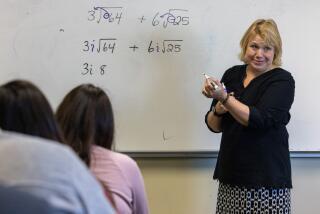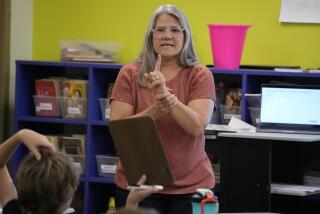The thinking behind a sonnet and a subset
- Share via
EVERY YEAR, as many California high school seniors struggle with basic algebra, which is required for graduation, Times readers complain, “Who needs it? How many students will ever use it?” Well, I use it every day; I’m using it now, even though I haven’t worked an algebraic equation since my son was in the seventh grade several years ago.
Mathematics and science are unnatural practices. As physics professor Alan Cromer has brutally and elegantly written, “the human mind wasn’t designed to study physics,” and of course mathematics is the language of physics. “Design” here does not indicate an intelligent designer, which would suggest a creator with a math phobia. Rather it indicates evolutionary processes by which the human brain and mind have come to be what they are.
During the approximately 2 million years that it took for our Homo forebears to progress from habilis to sapiens, they had little use for mathematical reasoning abilities. Their sapientia seems to have been more suited in a good Darwinian sense to the immediate demands of their survival, such as eating, mating and avoiding premature death. Whether for good or ill, as time may tell, our situations have changed much in the last few thousand years, and so have demands on our poor, lagging minds. I don’t mean only the obvious and oft-repeated claim that technical jobs require greater skills. That is clear enough in auto mechanics and computer programming. I mean the need to think abstractly, systematically and rationally in various ways.
Science and mathematics have the most exacting demands for such thinking, but there are many other disciplines that require it. Even the practices of critical reading and writing that I teach are soft but still demanding forms of rationality, and I occasionally fear that the human mind was not designed to study them either.
Fortunately, however, the mind can be altered; the brain can learn to function in different ways. We can even, if pushed hard enough, learn to think in what physicist Lewis Wolpert has called “the unnatural nature of science.” Because our minds are not greatly civilized into reason (as political speeches show), we need some hard instruction to learn to do what we do not do naturally, and as the ancient Greeks discovered, mathematics is a fine schoolmaster (or mistress) for that purpose. In most scholastic and academic disciplines, what you learn to think about is not as important as how you learn to think.
I encourage my college honor students to think in odd, even deviant ways, but I couldn’t do that if they had not already learned how to think abstractly and systematically. They have taken their algebra and physics and are ready to think still differently, even while becoming creative writers and musicians.
One of the most brilliantly wacky English professors I know once studied engineering. I was going to be a physicist before I was seduced into the pleasant valleys of the social sciences and humanities.
So let us not hear repeatedly that high school algebra is a waste of time because it does not directly train students for the job market. Even in a vocational program, it teaches the mind how to think. In some cases it might even teach students to think about the universe, which is a very nice way to spend one’s life.
Let us instead ask the harder question: How can we better prepare students to study algebra? It would surely not be easy, but it is worth doing.






